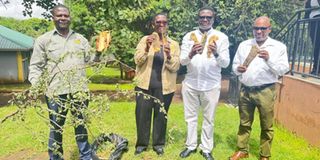Tanzania unveils natural breakthrough for hair regrowth and skin rejuvenation

What you need to know:
- The formulation has been officially registered under the name Composition for Hair Growth Stimulation or Hair Loss Prevention Using an Extract of Albizia anthelmintica.
Arusha. A 12-year scientific study by the Tanzania Wildlife Research Institute (Tawiri) has led to the discovery of a natural remedy that stimulates hair regrowth and prevents hair breakage – a major breakthrough offering new hope for individuals suffering from hair loss.
The announcement was made on Tuesday April 22, 2025 in Arusha, marking a milestone in Tawiri’s research on endangered medicinal plants with traditional healing properties, which began in 2013.
Derived from the bark of the Mporojo tree (Albizia anthelmintica), locally known as "wormwood," the hair treatment was discovered through close collaboration with local communities in Ngorongoro District, including the Maasai, Hadzabe, Datoga, and Iraqw ethnic groups.
“This is a significant development for people facing baldness, thinning hair, or breakage. Scientific testing has confirmed that Albizia anthelmintica possesses unique properties that promote hair regrowth and prevent hair loss,” said Tawiri’s director of research, Dr Julius Keyyu.
The formulation has been officially registered under the name Composition for Hair Growth Stimulation or Hair Loss Prevention Using an Extract of Albizia anthelmintica. It has also demonstrated potential in treating intestinal worms, malaria, and leg pain through the use of its roots, he said.
Tawiri has licensed the technology to South Korea’s Winwik Enterprise Ltd, which will manufacture a range of hair care products – including shampoos, oils, and treatments – for international and local markets.
Due to the increasing demand and medicinal value of the Mporojo tree, Tawiri has launched additional research on sustainable cultivation practices to mitigate the risk of extinction resulting from excessive harvesting in the wild.
In a parallel finding, researchers have identified a skin-lightening and anti-ageing compound derived from the Mugufe plant (Maerua edulis), known in the Datoga language as Ekwida. This formulation reduces wrinkles and enhances skin brightness, and has been registered under the name Composition for Skin-Lightening and Improving Wrinkles Using Extract of Maerua edulis.
Unlike the hair remedy, the skincare product has yet to be commercialised. Tawiri said it’s currently seeking partners and investors in the cosmetics industry to support its development and distribution.
Representing the director general of Tawiri, Mr Rogastian Msafiri said the broader objective of the research was to conserve traditional medicinal plants at risk of extinction by integrating them into botanical gardens and ensuring their sustainable use for community benefit.
The research project was a collaborative effort between Tawiri, the Institute of Traditional Medicine (ITM) under the Ministry of Health, and South Korea’s National Institute of Biological Resources (NIBR).




